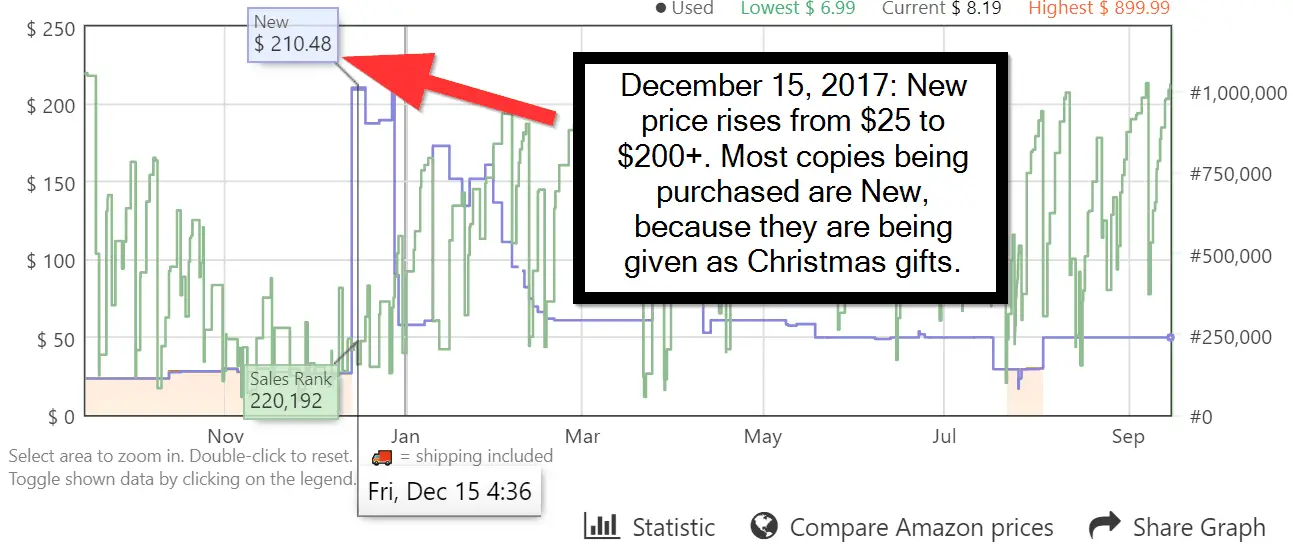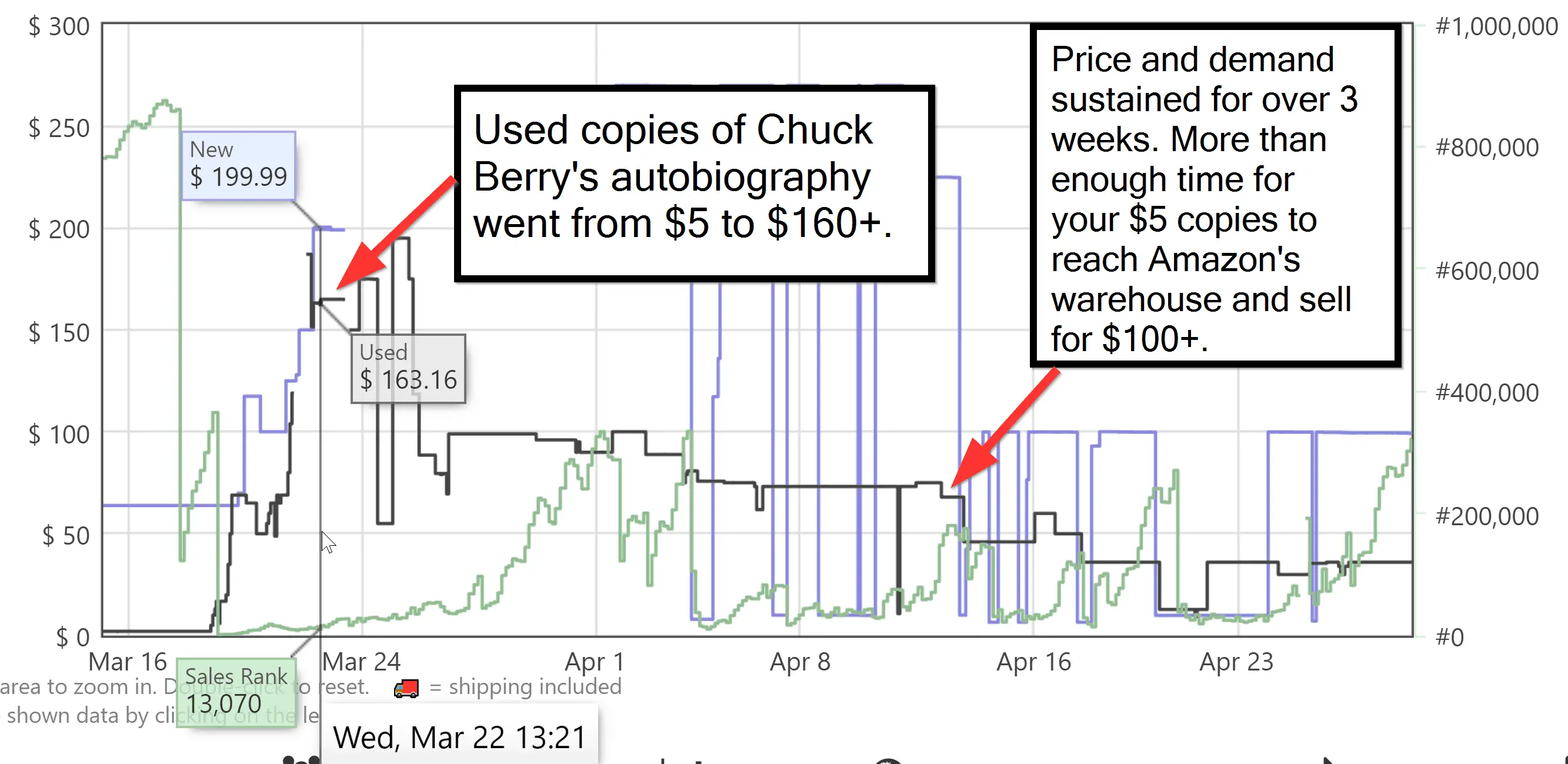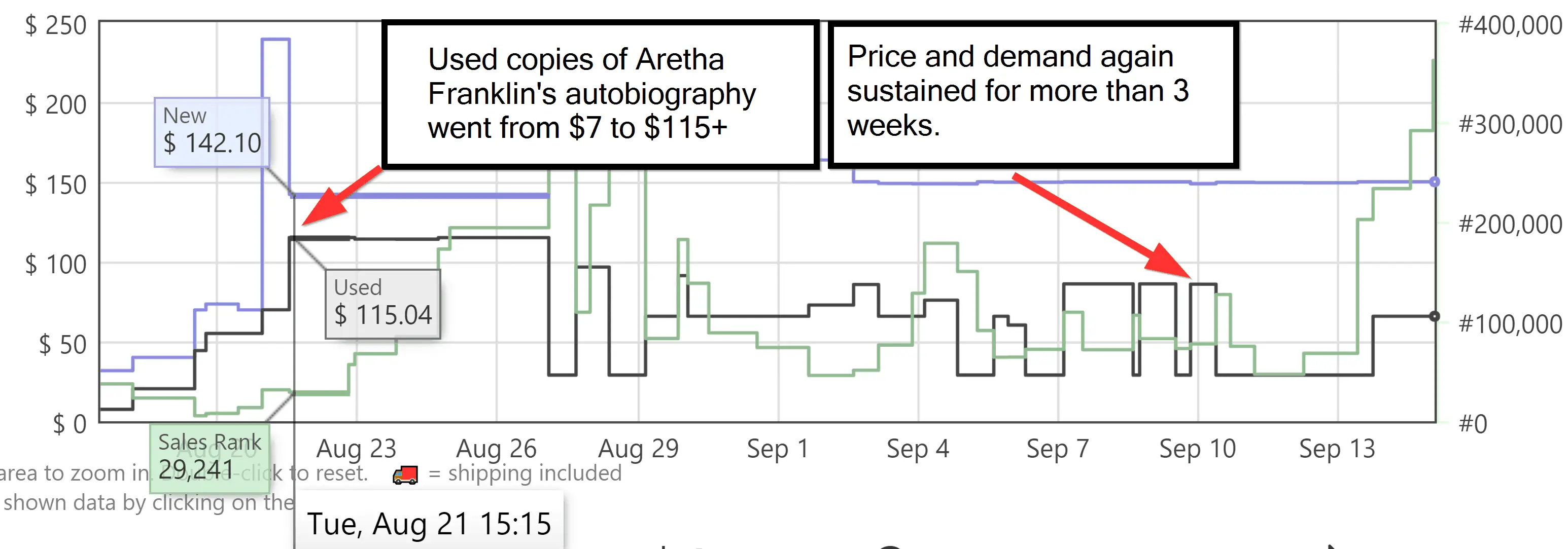Flip Those Books is an Amazon Associate. As an Amazon Associate we earn from qualifying purchases. We may also earn commissions if you purchase products from retailers after clicking on a link from our site.
1. Flip books given as Christmas gifts
New copies of books often spike in price before Christmas, when people are buying their Christmas gifts.
Now, this happens with many products, not just books. But of all the Christmas price increases, books are the most likely to see astronomical increases in price.
This is because a book’s value is subjective, and your perception of a book’s worth is based on how much you care about the subject.
A great example is this book about the Macy’s Thanksgiving Day Parade. Check out the Keepa graph:

You and I might think spending $210 on a book about a parade is ridiculous. But we’re not the ones purchasing the book for that price.
There are 2 kinds of people who will buy this book for $210:
- Someone who really cares about the Macy’s Thanksgiving parade.
- Someone buying a gift for someone who really cares about the Macy’s Thanksgiving parade.
In a strange twist, the $200 price actually adds to the book’s credibility and perceived value. The buyer is thinking, “Wow, $200 for this book? It must be really special.”
It seems nonsensical, but some people are more likely to buy the book for $200 than if the price was $25.
One more thing: most buyers don’t use Keepa to track prices. They have no clue the book was $25 a few days ago. All they know is it will cost $200 to see their loved one light up with happiness when they unwrap this thoughtful gift.
Want to wake up to a small fortune Christmas morning? Then use this varying perception of value to rack up ridiculous profits.
2. Source locally
There are thousands of books worth $50+ for sale within driving distance of your house. And most are selling for less than $1.
I’m not kidding. Local sourcing is how I got into the book game. It’s a lot of physical effort, but I’ll be damned if it isn’t lucrative. It brought me 97% share of my $109,304 in sales last year. It’s an amazing way to supplement your income, especially in the textbook arbitrage offseason.
If you’re interested in local sourcing, check out Peter Valley’s bookselling masterclass.
It’s an extremely detailed, 40-video guide to every single aspect of sourcing books locally. Peter is a great teacher who holds your hand through every part of the process.
3. Flip textbooks in the offseason
People need 2-day shipping on their textbooks year-round. In fact, someone buying in the middle of the semester is more likely to need 2-day Prime shipping than someone buying before school starts. Think about it— who is buying a textbook in the middle of the school year?
There are a few likely personas:
- Students who drop classes and switch to new ones. They’re far behind in the new course, and need to catch up as fast as possible. Oftentimes a 2-day Prime copy is the only viable option for this buyer.
- Students whose books are stolen or irreparably damaged. They need to complete assignments using their books. They need a legible copy now, and a 2-day Prime offer may again be their only hope.
- Professionals looking to read the book and learn its contents. Their need for fast shipping is not be as urgent as that of a student. They may still buy a Prime copy though, as they’re more likely to have the money to spend on the convenience.
Because there’s a good chance these buyers will buy a Prime copy, you can reliably flip textbooks in the offseason. You just need to choose books with a relatively high demand. I’d go for books under a 300k sales rank to be safe, though you can certainly go higher and still find profits.
4. Flip the autobiographies of recently deceased celebrities
I know. Profiting from death is sort of is terrible, but hey— money’s money. And a number of industries do it: funeral homes, house clean-out services— heck, many of the books you’ve flipped have probably come from the homes of dead people.
So if you want, you can include yourself in this cadre of death profiteers by flipping the autobiographies of recently dead celebrities.
Questionable morals aside, I can’t overstate how utterly ridiculous these profits are. Take a look at Chuck Berry’s autobiography.

$5 to $163. And it remained at that high price for more than 3 weeks.
Think that was a fluke? Check Aretha Franklin’s autobiography. It went from $7 to $115.

For the death of a famous person to result in these astronomical price spikes, the book and celebrity must meet a few criteria:
- The book needs to be out-of-print. If Amazon is stocked with new copies, they’ll likely be able to meet the increased demand, which means the price won’t go up.
- The celebrity needs to be A-list famous. I’m talking worldwide recognition. If they aren’t, the demand for their books won’t be high enough to cause a meaningful increase in price.
- The celebrity needs to be older. No one writes biographies or memoirs about younger celebrities.
The best way to lock in your profits is make sure you’re up-to-date on celebrity deaths. I advise using one of the following methods:
1. Use Google Alerts.
Google Alerts allows you to set an alert for a specific phrase. Whenever something related to your phrase appears on the web, you’ll get an email about it. I would type in a celebrity’s name followed by “dead” or “dies”. This is what most publications put in the headlines of death announcements.
2. Subscribe to TMZ’s RSS feed.
Despite their trashy tabloid style, TMZ is usually the first publication to break the news of a celebrity death. If you use an RSS reader like Feedly, you can get a constant feed of TMZ’s news. You don’t have to check it obsessively. Just browse through it every couple of days. It might make you a few thousand dollars.
Summary
We covered 4 ways to make money in the textbook arbitrage offseason:
- Flip books given as Christmas gifts
- Source locally
- Flip textbooks in the offseason
- Flip the autobiographies of recently deceased celebrities
These are just a few of the ways you can sustain your FBA business through the offseason.
But don’t just copy what I do. Take my strategies and improve upon them. Go the extra mile and devise your own unique, private sourcing methods. That’s where the real money lies.

